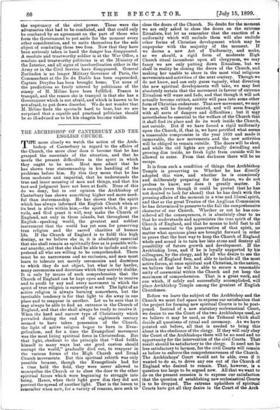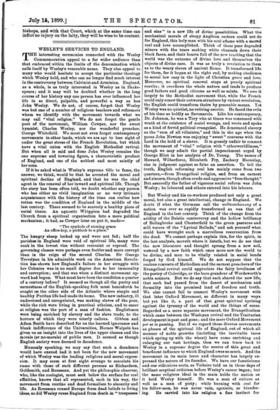THE ARCHBISHOP OF CANTERBURY AND THE ENGLISH CHURCH. T HE more
closely we watch the action of the Arch- bishop of Canterbury in regard to the affairs of the Church, the more clear does it become that he has grasped the essentials of the situation, and that he meets the present difficulties in the spirit in which they ought to be met. Most men admit that he has shown true statesmanship in his handling of the problems before him. By this they mean that he has been moderate and impartial, that he understands the true and inner meaning of men and things, and that his tact and judgment have not been at fault. None of this do we deny, but in our opinion the Archbishop of Canterbury has shown something higher and more need- ful than statesmanship. He has shown that the spirit which has always informed the English Church when at its best is alive within him,—the spirit which, if it pre- vails, and God grant it will, may make the Church of England, not only in these islands, but throughout the English - speaking world, the greatest and noblest instrument that the world has yet seen for preserving true religion and the sacred charities of human life. If the Church of England is to fulfil this high destiny, as we believe she is, it is absolutely essential that she shall remain as spiritually free as is possible with- out anarchy, and that she shall be able to include and com- prehend all who are willing to be comprehended. There must be no narrowness and no exclusion, and men must learn to tolerate not merely ceremonies and doctrines to which they do not object, but what is far harder, many ceremonies and doctrines which they actively dislike. It is only by means of such comprehension that the Church of England can be kept open and ready to receive and to profit by any and every movement in which the spirit of true religion is earnestly at work The light of an active religion is always burning somewhere, but the inevitable tendency is for that light to die away in one place and to reappear in another. Let us be sure that it may always be able to find an entrance in the Church of England, and that she shall always be ready to receive it. When the hard and narrow type of Christianity which prevailed during the end of the eighteenth century seemed to have taken possession of the Church, the light of active religion began to burn in Evan- gelicalism, and for a time the Evangelical movement was the most living spiritual force in Christendom. But that light, obedient to the principle that "God fulfils himself in many ways lest one good custom should corrupt the world," gradually died out, to reappear in the various forms of the High Church and Broad Church movements. But this spiritual rebirth was only possible because, though the Evangelicals had for a time held the field, they were never allowed to monopolise the Church or to close the door to the other spiritual forces which were beginning to struggle into being. Hence, when their light grew dim they did not prevent the spread of another light. That is the lesson to remember when now, for a variety of reasons, men seek to the supremacy of the civil power. These were the close the doors of the Church. No doubt for the moment we are only asked to close the doors on the extreme Ritualists, but let us remember that the exaction of a uniformity which will exclude them will also exclude other forms of Christian development which may be unpopular with the majority of the moment. If we decree a new Act of Uniformity, and make, as we should, a rigid form of moderate High Church ritual incumbent upon all clergymen, we may fancy we are only putting down Ritualism, but we shall in reality be closing the doors of the Church, and making her unable to share in the most vital religious movements and activities of the next century. Though we do not know, and can only guess vaguely, what direction the new spiritual developments will take, we may feel absolutely certain that the movement in favour of extreme Ritualism will wane and fade, and that though it will not actually become extinct, activity will pass into some other form of Christian endeavour. That new movement, we may be sure, will be fiercely resisted, and will seem fraught with all sorts of dangers and difficulties ; but it may nevertheless be essential to the welfare of the Church that it shall find its place and do its work inside the Church, not outside. But if we have forced a rigid uniformity upon the Church, if, that is, we have petrified what seems a reasonable compromise in the year 1899 and made it immovable, the new movements and the new activities will be obliged to remain outside. The doors will be shut, and while the old lights are gradually dwindling and growing dim inside, no fresh light from outside will be allowed to enter. From that darkness there will be no escape.
It is from such a condition of things that Archbishop Temple is preserving us. 'Whether he has directly adopted this view, and whether he is consciously and deliberately preparing for the future, we do not profess to know, nor does it greatly matter. It is enough (even though it could be proved that he has not desired to look far ahead) that he has dealt with the pressing affairs of the moment in a wise and ]iberal,spirit, and that as the great Trustee of the Anglican Communion he has determined to preserve to the full the comprehensive character of our Church. Whether or not he has con- sidered all the consequences, it is absolutely clear to us that he understands and appreciates the true spirit of the Church of England, and that he means to hold fast to all that is essential to the preservation of that spirit, no matter what specious pleas are brought forward in order to prove that the best way to keep the Church of England whole and sound is to turn her into stone and destroy all possibility of future growth and development. If the Archbishop lives, and if he is loyally supported by his colleagues, by the clergy, and by all who desire to see the Church of England free, and able to include all the most active forces, at once spiritual and Christian, in the. nation, we believe that he will be able to secure a reasonable unity of ceremonial within the Church and yet keep the maximum of comprehension. That is a great work, and one which, if safely and successfully accomplished, will place Archbishop Temple among the greatest of English Churchmen.
Before we leave the subject of the Archbishop and the Church we must tind space to express our satisfaction that the project for forming new spiritual Courts is to be post- poned. Instead of a new statutory ecclesiastical Court, we desire to see the Court of the two Archbishops used, as we believe it may be used, as the Tribunal which shall decide all questions of ritual and ceremony. As we have pointed out before, all that is needed to bring this about is the obedience of the clergy. If they will only obey the Court of the Archbishops there will be no need and no opportunity for the intervention of the civil Courts. That result should be satisfactory to the clergy. It need not be less satisfactory to laymen, for the civil Courts will remain as before to enforce the comprehensiveness of the Church. The Archbishops' Court would not be able, even if it wanted to do so, to drive any one out of the Church of England who desired to remain. That, however, ie a question too large to be argued now. All that we want to do on the present occasion is to express our satisfaction that the question of establishing new ecclesiastical Courts is to be dropped. The extreme upholders of spiritual Courts have got all they desire in the Court of the Arch
bishops, and with that Court, which at the same time can inflict no injury on the laity, they will be wise to be content.







































 Previous page
Previous page